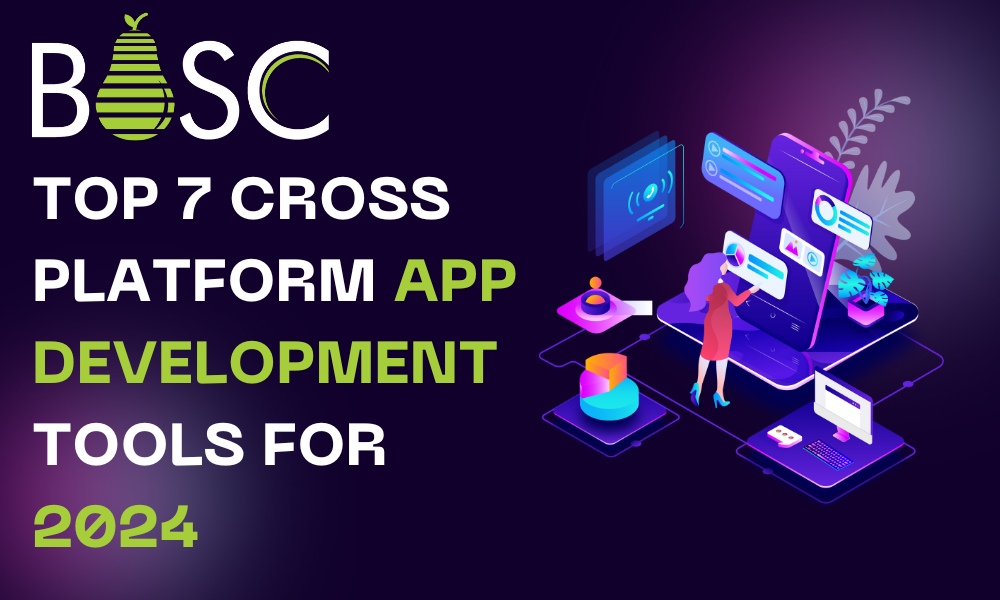
Top 7 Best Cross-platform App Development Tools for 2024
Smartphone applications have become a must for all organizations around the world. A responsive and functional mobile app development gives a better way to participate in consumer engagement and is directly delivered to the fingertips.
With the rise of mobile devices and the internet for a few years, these apps must run seamlessly across multiple platforms to give a better user experience.
With the help of these cross-platform development tools, enterprises can get these apps into the market quickly and cost-effectively. Hence, these tools permit the organization to launch viable apps without much technical knowledge and get competitive benefits in the market.
This article will show some of the leading cross-platform mobile application development tools that benefit the business.
What is cross-platform app development?
Cross Platform app development usually creates software solutions compatible with different operating systems like iPad, macOS, Android, etc.
The driving force behind cross-platform development is to make apps that are not restricted to working in a particular digital environment, aiming to reach a wider audience. In contrast, native app development will create various versions of the single app for each platform.
Usually, the process of development of the mobile apps is for the various habitats to create a separate backend for each platform or can make the backend which will work on a distinct platform. Hence, many organizations prefer cross-platform applications for multiple platforms, which could reuse in the future for other purposes.
Cross-platform mobile application development tools will make it easier for programmers to simultaneously launch applications on various operating systems.
Many of the new approaches are related to cross-platform applications development which includes:
1. Hybrid mobile applications development:
In this, the core codebase of an app is placed in the native device wrappers for the various digital habitats.
2. Progressive web apps:
This framework gives the websites a good look and will behave like native apps by utilizing mobile device features without downloading an original app.
3. Rapid Mobile App Development:
It is also known as the RMAD, which uses low-code or code-free programming tools to create enterprise mobile applications development that will address specific problems.
What are the business benefits of Cross-platform development?
Let’s see some of the advantages associated with cross-platform application development.
1. Launches software simultaneously on different platforms
You can launch your software rapidly on multiple platforms when you work on cross-platform application development. The source code is written only once for all platforms. You do not need to hire separate software development teams for each platform, as it is possible to launch and update the software using various cross-platform development tools.
2. Faster development time
It must deploy a single script rather than write separate scripts for each platform. It will frequently speed up the development time and cut down the time to market, benefiting everyone, from the dev team to the marketing team.
3. Reaches a wider audience
Cross-platform application development provides you with the opportunity to reach a larger audience. Hence, if your app is compatible with different platforms and the operating system like the web, iOS and Android, then it can be used by many users. Therefore, it is a great way to maximize exposure with the least effort and time.
4. Fast and easy updates
As cross-platform applications are internet-based, updates are easy to do. The users can download the separate updates, which require maintenance and support of various application versions. An app is updated automatically for all the clients to ensure they have the latest version of the app, which positively impacts the mobile application’s performance.
5. Cost savings and shorter time to profitability
With cross-platform app development, your time-to-market for each platform is shorter if you have decided to build every app from scratch. It means that your software will generate revenue as early as possible. You do not require to maintain the software development team for each platform for launching your mobile app, as it will bring significant savings over time.
Which are the best tools for cross-platform mobile app development?
Nowadays, many SDKs, toolkits and leading frameworks help mobile app development come up with robust and powerful cross-platform apps. Let’s see some of the most reliable tools for your cross-platform enterprise apps.
1. Flutter
Flutter is the free, open-source SDK for cross-platform development delivered by Google. It is an excellent tool for making native interfaces for Android and iOS. Besides that, there are several reasons Flutter stands at the top of the cross-platform development tools.
Advantages
- Flutter is excellent for MVP development. It can help you to get an application that is native on both iOS and Android in less time.
- Its Hot reloading functionality will reflect any changes in the code within a few seconds.
- It is dependent on the object-oriented programming language, i.e., dart. Hence, you will easily find experts with excellent skills and experience.
- The number of ready-made tools lets the developers work with the other constant implementation platforms such as Jenkins and Travis.
2. React Native
React Google introduced native in 2015 as a robust and lightweight cross-platform app development tool. Thus, it has brought a transformative wave within the cross-platform framework’s market. It supports you in developing applications for Android, iOS, and Windows. Hence, you can expect cross-platform apps with native-like effectiveness.
Advantages
- About 90% of the codebase is shareable across various platforms. It will significantly speed up an entire process.
- You can preview the results immediately and use ready-to-apply elements that will make an app even better. Hence, everything becomes a lot more sophisticated.
- Just like a Flutter, this also has a Hot reloading feature. Thus, you can track changes in the codes within a few seconds.
- It is known for developing high-quality and responsive user interfaces with native-like functionalities.
3. Ionic
Ionic is a cross-platform mobile development tool that can leverage to make apps which are faster and have a small footprint. These apps are based on the “write once and run anywhere” principle, which is more scalable.
Advantages
- It has come up with various out-of-the-box UI components to ensure better results.
- With hardware-accelerated transitions, apps provide a better user experience.
- It is implemented with frameworks like Vue and Angular.
4. Xamarian

Xamarian is the tool that is launched as the solution to the issue of the technology stack. It simplifies cross-platform mobile app development, which was previously difficult and costly. This development platform is based on the .NET and C#. It can help you to create applications for Windows, iOS and Android.
Advantages
- It uses the C# for programming, running smoothly on most platforms, specifically Android and iOS.
- 80% of the code is sharable on all platforms and follows the principle “write once, run everywhere”.
- Moreover, it has a single technology stack that will help in faster development.
5. Adobe Phone Gap
It is an open-source, robust cross-platform development platform dependent on the Apache Cordova project. It will help to create the web application using HTML, JavaScript, and CSS. Adobe PhoneGap has a clear record of making native-like cross-platform applications for various requirements.
Advantages
- It comes up with a broader range of UI libraries that helps to improve an overall user experience.
- The flexible framework has the most significant aid for making the apps faster and with minimal effort.
- It has no hardware restrictions so an expert can develop featured-rich applications.
6. Sencha
This cross-platform development framework depends on HTML5, CSS, and JavaScript to create robust web or mobile apps with impressive UIs. The enterprise-level SDK and the development solution are used to develop excellent iOS, Blackberry, and Android applications with native-like features and functionality.
Advantages
- This framework has come up with a “Touch” feature, and it is easy to navigate.
- Developers can create highly customized applications with a vast collection of UI widgets.
- It uses JS, HTML, and CSS, so developers find it easy to use.
7. Appcelerator
It has the Titanium SDK framework, which is used for native and cross-platform app development. In addition, the Appcelerator can work with different technologies and platforms. You can get yearly and monthly subscriptions.
Advantages
- It is easily integrated with Vue and Angular
- It is simple to learn and leverage with JavaScript components for its development.
- Appcelerator lets the developers create the prototypes quicker since it needs less coding.
8. Node.js
Node.js is an open-source platform cross-platform app development framework that is free to use. A server-side app is usually done with it and was developed in 2009. The start-ups and existing businesses used it due to its excellent functionality and features. However, JavaScript modules are available in the library that will simplify web app development.
Advantages
- It gives the developers a large pool of frameworks to choose from when developing cross-platform apps.
- The principle of JavaScript made it easy to acquire knowledge. Hence, the JS programming language is the most popular among programmers.
9. Firebase

It is platform that is one of the leading cross-platform app development frameworks available to app engineers worldwide. This software has robust features for developing, enhancing, and managing apps. It has various features like push messages, analytics, data, etc. Hence, these services are cloud-hosted, and the developers are able t perform the on-demand scaling efficiently and quickly.
Advantages
- It provides a real-time database that gives experts offline access to the apps without internet connectivity.
- Beginners can quickly learn as it has well-defined technical documentation.
- You can implement the new functionalities with the pre-made APIs with only a few clicks.
Conclusion
Many more resources and tools exist in the technological market with great cross-platform mobile applications. However, in this blog, we have covered most of the leading cross-platform tools that will be helpful in your development phase.
As a leading and award-winning web and mobile app development company, we understand the need and features necessary to make the apps successful. Hence, our competent and innovative team helps you navigate all the challenges and problems. If you still have queries, feel free to contact us!
Frequently Asked Questions (FAQs)
1. What is the significant benefit of cross-platform development?
Cross-platform development permits you to reach a wider audience, as it is possible to develop an app compatible with various platforms, such as the web, Android, and iOS. In this manner, you can increase the presence of your market without spending too many resources.
2. Why is cross-platform preferred more in comparison to native app development?
Native mobile application development allows you to build apps for specific iOS and Android OS. Whereas cross-platform, you can create the apps by targeting several platforms.
3. Are cross-platform apps in demand?
Cross-platform mobile app development is in high demand as many enterprises are looking to deliver customers apps that can use on various devices with a single codebase. Hence, these types of apps ensure fast and accurate app delivery, which will increase revenue opportunities.
Inquire Now
